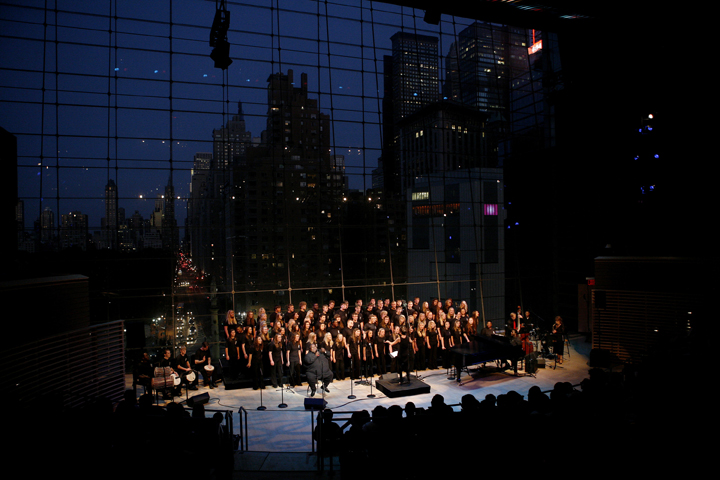Good news! Gospel is alive and well in Minnesota. “Gospel” means “good news,” so this is particularly appropriate. Distinguished Concerts International New York (DCINY) presented a thrilling evening of mission-inspired music in a concert entitled “Dream a Better World…Ignite the Spirit!” at Alice Tully Hall on Saturday, June 14, 2014.
Once in a very great while, all critical apparatus simply must be thrown out the window in favor of a totally emotional “surrender” response to music-making that is so energetic and joyful that words would only diminish it. Nevertheless, I must try with a few words to convey a portion of what took place.
This is the very best of what American youth looks like, in an era when the din of school shootings and bullying threatens to absorb all our attention. Not only was the dedication of the students bursting forth, but the obvious glory of their fine teacher, Darcy Reese, and the supporting musicians and the community that gives rise to the group. The choir celebrates and emphasizes diversity. You can see the joyful commitment on every face. They move and respond naturally to the music in a way the canned antics of the television show Glee can’t equal. This is the real thing: glee.
I was seated amid many Minnesotans, who were beaming with pride. I heard their stories of cancelled flights, and four-, ten-, twelve-hour delays in getting to New York. It was all worth it for them and for the audience. Their children sang a two-hour program of excellent, mostly gospel, arrangements, all from memory. Many solo turns were taken by members of the choir, and they all performed with exquisite poise and sincerity. A few of the pieces were more like “soft” belief-oriented rock, and there were also a few readings made over background music.
The T.H.I.S. (The Hero Inside Shines) Movement was particularly inspiring, with its mission: “We refuse to let the world be as it is. We refuse to blind ourselves by excuses and lies. We are determined to have an effect on the world. We will persevere and change our world, one action, one note at a time.” The students have raised thousands of dollars for worthy causes, including Haiti, Africa, and the “Bully Bench” for children to sit on if they have no one to play with at recess, from a hometown of only 8000 people. If they had blown the roof off of Alice Tully Hall more than metaphorically, I’m certain their life-affirming energy would have spilled over the city, healing and transforming.
Special mention must be made of the heaven-bound singing of the guest artist Tonia Hughes, and one incredible pianist, Aaron Fagerstrom, whose understanding of authentic gospel style goes way beyond his young years. He made me smile when he finished a certain phrase using his wrist as a shock absorber, tapering beautifully and sensitively in the best “classical” manner.
In the words of Ms Reese: “Take the journey, experience the music, and pass it on.” Mission accomplished.


